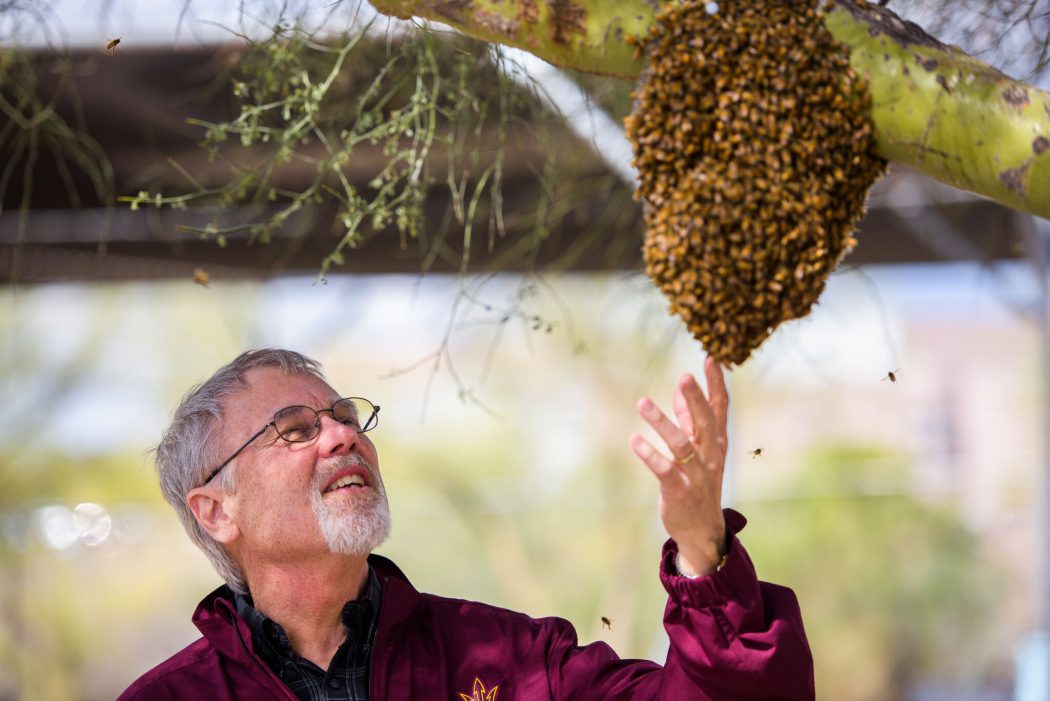DAVIS–Noted honey bee geneticist Robert E. Page Jr., a UC Davis and Arizona State University emeritus professor and administrator, has authored a newly published, invited article in the journal Genetics on “Societies to Genes: Can We Get There from Here?” that highlights his three-decade scientific career. (See https://bit.ly/3iySpYU)
“I was thrilled to be invited to write this perspectives/review of my scientific career; it is a collection of 30 years of single-minded focus on one question,” said Page, who is renowned for his research on honey bee behavior and population genetics, particularly the evolution of complex social behavior, and for his work on the first genomic map of the honey bee.
“The editors contacted me to write a perspectives/review that focuses on my own work, a study in complex adaptation,” Page related. “This is the first time they have done a perspectives article like this. I was, of course, honored. More than half of the work was done at UC Davis.”
“Understanding the organization and evolution of social complexity is a major task because it requires building an understanding of mechanisms operating at different levels of biological organization from genes to social interactions,” Page wrote in his abstract. “I discuss here, a unique forward genetic approach spanning more than 30 years beginning with human-assisted colony-level selection for a single social trait, the amount of pollen honey bees (Apis mellifera L.) store. The goal was to understand a complex social trait from the social phenotype to genes responsible for observed trait variation.”
“The approach,” Page wrote, “combined the results of colony-level selection with detailed studies of individual behavior and physiology resulting in a mapped, integrated phenotypic architecture composed of correlative relationships between traits spanning anatomy, physiology, sensory response systems, and individual behavior that affect individual foraging decisions. Colony-level selection reverse engineered the architecture of an integrated phenotype of individuals resulting in changes in the social trait. Quantitative trait locus (QTL) studies combined with an exceptionally high recombination rate (60 kb/cM), and a phenotypic map, provided a genotype–phenotype map of high complexity demonstrating broad QTL pleiotropy, epistasis, and epistatic pleiotropy suggesting that gene pleiotropy or tight linkage of genes within QTL integrated the phenotype. Gene expression and knockdown of identified positional candidates revealed genes affecting foraging behavior and confirmed one pleiotropic gene, a tyramine receptor, as a target for colony-level selection that was under selection in two different tissues in two different life stages. The approach presented here has resulted in a comprehensive understanding of the structure and evolution of honey bee social organization.”
Page, who received his doctorate in entomology (1980) from UC Davis, joined the UC Davis entomology faculty in 1989, and chaired the department from 1999-2004. In 2004, Arizona State University recruited him as founding director of its School of Life Sciences. His career advanced from dean of Life Sciences, to vice provost and dean of the College of Liberal Arts and Sciences, to university provost. Today he holds the titles of ASU provost emeritus, ASU Regents professor emeritus, and UC Davis distinguished emeritus professor, an award bestowed in 2019.
At UC Davis, Page worked closely with Harry H. Laidlaw Jr., (the father of honey bee genetics) for whom the university’s bee facility is named.
For 24 years, from 1989 to 2015, Page maintained a UC Davis honey bee-breeding program, managed by bee breeder-geneticist Kim Fondrk at the Harry H. Laidlaw Jr. Honey Bee Research Facility. Together they discovered a link between social behavior and maternal traits in bees.
Page has authored than 250 research papers, including five books: among them, The Spirit of the Hive: The Mechanisms of Social Evolution, published by Harvard University Press in 2013. His most recent book is The Art of the Bee: Shaping the Environment from Landscapes to Societies, published by Oxford University Press 2020. (Page is a highly cited author on such topics as Africanized bees, genetics and evolution of social organization, sex determination, and division of labor in insect societies.
Kathy Keatley Garvey
UC Davis Department of Entomology and Nematology
kegarvey@ucdavis.edu









